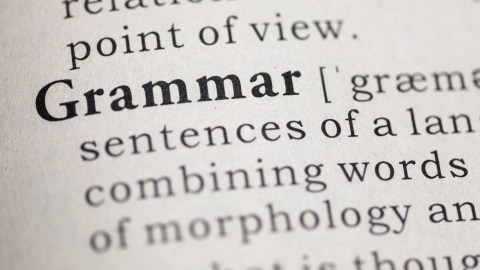Grammar Wars: The Battle of the Oxford Comma

What’s the Latest?
Linguist Arika Okrent has a fun piece on Mental Floss today. In it, she details numerous arguments for and against the most controversial piece of punctuation in the history of controversial pieces of punctuation: the Oxford (or serial) comma. Named as such because of its support in the Oxford University Press style guidelines, the Oxford comma is placed before the final conjunction in a list. For example: “Tina went to lunch with her husband, a lawyer, and her therapist,” the Oxford comma being the one coming before “and her therapist.” The natural argument for the Oxford comma is that without it, the above sentence could be interpreted to mean Tina’s husband is both the lawyer and her therapist. The common argument against the comma is that it tends to clutter sentences and impedes clarity.
What’s the Big Idea?
Okrent’s article is a list of greatest hits in the ongoing battle between pro- and anti-Oxford comma factions. Grammar and Punctuation are serious business and folks tend to offend and be offended by its support and slights.
Here are a couple of my favorite examples from the piece:
“Pro: This book is dedicated to my parents, Ayn Rand and God”
“Anti: The English are rather more careful than we are, and commonly put a comma after the next-to-last member of a series, but otherwise are not too precise to offend a red-blooded American.”
The implication that the Oxford Comma is downright Un-American is tickling to me, as if not using it is akin to eating Freedom Fries.
I don’t want to come out as either a supporter or detractor of the contentious comma (I am, after all, but a humble blogger), but let’s just say that I find this entire debate entertaining, churlish, and more than just a little silly.
What say you, Associated Press?
We generally don’t use the Oxford comma in a simple series, @johannaharvey: The U.S. flag is red, white and blue. #APStyleChat
— AP Stylebook (@APStylebook) May 29, 2013
All you have to do is search Twitter for "Oxford Comma" to plunge yourself into this esoteric, often acerbic debate.
There is no piece of culture more defining for a people than language, especially the ways in which it is used and modified over time. This is why it's sort of understandable why folks will toil over and over again in this debate, fighting for and against this precarious piece of punctuation.
What do you think? Is the Oxford Comma good, important, and necessary or is it lousy, outdated and unclear?
Read more at Mental Floss: "The Best Shots Fired in the Oxford Comma Wars"
Photo Credit: Feng Yu/Shutterstock





